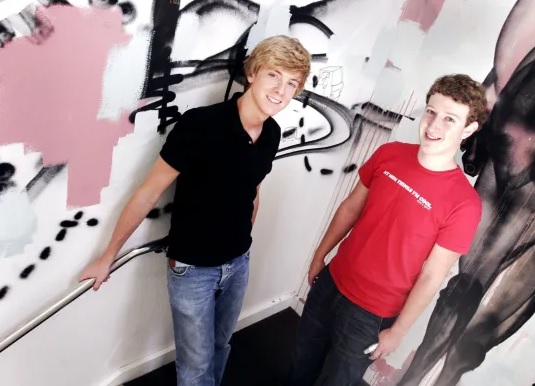
Facebook turns 20-years on Sunday: Here's all the good, bad, ugly plus happy moments
Facebook has come a long way since its early vision of connecting people all over the world.
Advertisement
Beyond the status updates, profile picture changes, and hilarious memes shared by billions of users over the years, there’s a more complicated side to its legacy.
Sit down, because we have shocking news. Wait, you probably already are, because Facebook turns 20 on Sunday and that means we’re all old.
Yes, 20, two-zero. Facebook can almost drink in America.
It’s the same age as Millie Bobby Brown, who is surely still 14. Roger Federer won his first Australian Open days before its launch. He has won five more since.
That same month Janet Jackson suffered her infamous ‘wardrobe malfunction’ and Kanye West released The College Dropout. Hey Ya! was number one, and Lindsay Lohan was at the height of her career.
Facebook, now Meta, started from humble beginnings 20 years ago on Feb. 4, 2004. A college sophomore, Mark Zuckerberg, launched the site from his Harvard dorm room, unaware of what the company would become.
Currently, Meta has a market value of $599 billion and more than 3 billion people use at least one Meta product daily. Clarified takes a look back through the past two decades at Meta, its achievements and scandals, and posits what the future may look like for the tech titan.
Zuckerberg first formulated the site in 2003 when he infamously created a website that encouraged its users to rank the attractiveness of his fellow classmates. The website was quickly disbanded after being accused of privacy violations.
Shortly after in 2004 he built thefacebook.com to connect students at Harvard. The site expanded to include other students across the country and by June of that same year, 250,000 students were signed up from more than 34 colleges. By the end of 2005, it had 6 million active users and advertisers.
Now, without us realising, two decades have passed. The cool, early adopters of this genuinely world-changing website are now parents, aunties, uncles, grandparents, managers, business owners, doctors. Grown-ups.

But ignore the dawning realisation that time flies swifter than a quick poke, and cheer yourself up with a reminder that the first face of Facebook was not its founder Mark Zuckerberg. It was Al Pacino.
Remember ‘the Facebook Guy’? That was him, hastily Photoshopped onto the original blue and white logo.
We’re pretty sure he didn’t give permission for that, but should be glad the tech behemoth had at least evolved to Facebook, not version 1.0, aka Facemash.
In the many, many years since its inception, with all the good and bad Facebook has brought to our lives, it’s easy to forget it was invented as a way to rate how hot female Harvard students were.
Not cool.
It was in 2003, while a student at Harvard, that Zuckerberg took inspiration from the renowned university’s ‘face book’ student directory, a paper guide featuring photos and personal information about classmates.
Facemash was an instant hit, generating 22,000 views in hours. However, it was shut down by Harvard days later, and Zuckerberg was left facing expulsion over, among other things, a breach of privacy.
Undeterred, on February 4, 2004, he unveiled Thefacebook, co-founded with four other students. Initially only available to Harvard students, it quickly grew such a following it was extended to Columbia, Stanford and Yale. Soon after it spread to all Ivy League colleges, and dropped the ‘the’.
Then finally, on September 26, 2006, everyone over the age of 13, not just those at elite and very expensive universities, could be part of the gang.
Queue a revolution in how we communicated, shared our lives and kept track of exes.
Advertisement
It wasn’t the first social media platform or networking site. MySpace was a trailblazer of the genre, while Friend Reunited had already been around almost four years by this point.
As the years passed by (20 of them, remember) users multiplied across the globe. Making friends moved online. Brief encounters that would previously have been forgotten were digitally etched into your memory, only to crop up on your timeline years later, sharing photos of partners and children you never have, or will, meet.
In fact, you’re not entirely sure who they are, to be honest. Maybe you met them on a gap year?
But Facebook was not just a revolution for individuals. The collective effect of this mass communication has had ramifications for society that have reverberated around the world.
Advertisement
One, fairly major, example – a Facebook executive claimed the company was ‘responsible’ for Donald Trump winning the 2016 election, now a widely accepted view.
There have been many highs and lows for the company – and Zuckerberg, now worth around 140 billion.
When it was first floated on the stock market, Facebook was valued at $104 million.
A year later, Microsoft invested $240 million in the company.
Advertisement
But money isn’t everything.
In 2019, a gunman live streamed his assault on a mosque in New Zealand, in which he murdered 51 people.
This week, Mark Zuckerberg testified in US Congress over child safety on social media platforms.
The existing body of scientific work has not shown a causal link between using social media and young people having worse mental health,” the Facebook founder said in a room full of families whose children they say were mentally harmed — some to the point of suicide — by social media use.
Zuckerberg was grilled by a number of senators, taking the brunt of their clear disdain for social media. Lindsey Graham told Zuckerberg and his fellow social media executives that they “had blood on their hands.”
After relentless chiding by Josh Hawley, Zuckerberg stood and apologised directly to the affected families in the hearing room.
Critics of Meta, and social media more broadly, have compared the companies’ business tactics and addictive qualities to tobacco, with one attorney, Matthew P Bergman, arguing the companies are “far more reprehensible than asbestos companies”.
Facebook has become the platform of choice for many conspiracy theorists and peddlers of fake news. InfoWars’ Alex Jones repeatedly pushed claims that victims of the 2018 Parkland shooting were paid actors – something that cost him almost $1 billion.
But today is a celebration. There’s a lot to say about the bad things Facebook has done (we’re looking at you, Cambridge Analytica), but with more than 3 billion users, our love affair with TheFacebook is clearly still going strong.
It has brought people together, reunited old friends and family, introduced future husbands and wives. It has offered support to those in need, shown those who thought they were alone or the only one that they weren’t.
People have set up businesses, changed careers.
And shared a whole lot of photos. Lives have been documented for the last 20 years, preserving previous memories in a vast archive far superior to any photo album or scrapbook before it. They can’t do video for starters.
So this weekend, shrug off the crushing feeling that life is finite, and let Facebook take you on a walk down memory lane.
And don’t be too hard on yourself. You look just as good now as you did in 2004.




